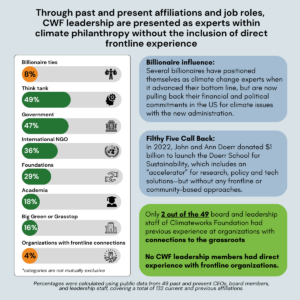As grantmakers show increased interest in funding Southern partners, it’s important to ask: What’s different about relationship-building and racial justice work in the American South? How can national funders be responsive and impactful in operationalizing their desire to support the region?
Recognizing that the South is already home to a strong ecosystem of people-of-color (POC)-led philanthropic institutions that can help drive resources for racial and social justice, on June 14th NCRP co-hosted “The Color of Philanthropy: Southern Leaders, National Potential” with ABFE, the Southeastern Council of Foundations and Grantmakers for Southern Progress.
The webinar explored the crucial role of POC-led philanthropy in the South and how national grantmakers can learn from and partner with these institutions for significant impact not only in the Southern region, but nationally.
Moderated by Takema Robinson, CEO and principal of Converge Consulting and director of the Greater New Orleans Funders Network (@Takema_Robinson), the discussion featured insights from:
- Flozell Daniels, Jr., president and CEO of the Foundation for Louisiana (@FlozellDaniels)
- Felecia Lucky, executive director of the Black Belt Community Foundation (@fjonesF)
- Karen Watson, executive director of the Positive Action Committee
- Fernando Cuevas, executive director of the Southern Partners Fund
The conversation built on do’s and don’ts for Southern philanthropic investments articulated in the first report from As the South Grows, a joint campaign between NCRP and Grantmakers for Southern Progress (GSP) to attract more foundation support for work that leads to equity and systemic change in the South. The first report in in the series, “On Fertile Soil,” explores power-building among marginalized communities in the Alabama Black Belt and the Mississippi Delta.
KEY TAKE-AWAYS
1. Relationships: Work in the South requires presence, proactive relationship-building and deep connection to community. Southern philanthropic partners, particularly those that represent the communities they serve, have the reach and cultural competency to ensure trust and sustainability.
In the south, relationships build sustainability. Invest in building those relationships. @NCRP #fundsouth #asthesouthgrows
— Jeanné Lewis (@msjeannelewis) June 14, 2017
"Relationship building is the work. You have to go slow to go fast." #FundSouth @NCRP
— Jaime-Jin 🍳 (@jaimejin) June 14, 2017
2. True partnership: Southern leaders directly affected by inequity and injustice need to be real partners in designing and implementing social change efforts. Funders must engage in a dialogue with community to be effective in the South, and local philanthropies rooted in community can help build that bridge.
"Partnerships won't thrive when somebody who doesn’t even know the work decides what the work is." –Karen Watson #FundSouth
— Invested Impact (@InvestedImpact) June 14, 2017
Karen Watson speaking truth to power on working w/ nat. funding partners–Follow local plans/decisions. Don't impose your own. #fundsouth
— Kathleen Enright (@Enright4good) June 14, 2017
3. Sustainability: Funding to the South has remained a trickle – despite the fact that more people live in the South than in any other region of the country – and it often comes in the form of short-term investments with top-down agendas about what the work should look like. Systemic change and capacity building in the South require a long-term approach from funders, with trust in community-led decision making. Place-based intermediaries can support the flow of resources.
https://twitter.com/Ebbdubb/status/875044819323826179
On capacity bldg-who decides? For what? How will it be sustained? Grantee should tell YOU what's needed. #FundSouth @NCRP @givingforum @COF_
— ABFE (@ABFE) June 14, 2017
Very condescending to go to rural South and ask people to do $200,000 worth of work for $30,000. — Karen Watson #FundSouth #AstheSouthGrows
— NCRP (@NCRP) June 14, 2017
4. Ground zero: It is important for funders to recognize the South not only for its assets and legacy of civil rights infrastructure, but also as the birthplace of many reactionary leaders and laws. Crowd favorite Karen Watson observed:
“Look at how much regressive policy is being led by Southern politicians, and look at their access to the presidential administration. When people get ready to be regressive, they go and get Southern politicians. The [federal] policies we find ourselves organizing against are often policies started in the South and because the rural South remains underfunded, there was not enough organizing to stop the policies when they started in the rural South. So they spread across the state and region and eventually became some aspect of national policy. Funders need to understand that as long as they keep underfunding the South, they will keep birthing this behavior that will spread nationwide.”
National and non-Southern organizations have much to learn from Southern counterparts who have played important roles in combatting and defeating racist and regressive policy, both regionally and nationally. Our featured speakers encouraged funders to listen to and learn from Southern leaders who represent marginalized communities, and to be prepared to make sustained investments not just of grantmaking capital, but of relationship and reputational capital.
Thank you again to our co-hosts, moderator and featured speakers, and to those who joined us for the rich discussion. We encourage funders and nonprofit partners to share the webinar recording and continue the conversation on high-impact philanthropy in the South. And stay tuned for the next installment in the As the South Grows series on Appalachian Kentucky and the Low Country of South Carolina, set to be released on June 26!
 Thank you to Ryan Schlegel and Stephanie Peng for their help with the webinar and this post.
Thank you to Ryan Schlegel and Stephanie Peng for their help with the webinar and this post.
Caitlin Duffy is senior associate for learning and engagement at the National Committee for Responsive Philanthropy (NCRP). Follow @NCRP and @DuffyInDC on Twitter.
































































































































































































































































































































































































































